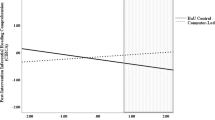Abstract
This study examined the effects of (a) interactive reading homework, and (b) parent involvement with children during homework on students' responses to inference questions. Interactive reading homework refers to homework designed to involve both parents and children and to facilitate student reasoning. The participants were 84 parents and 84 second grade students from three Alabama elementary schools. Data were gathered using pre- and post student inference tests, parent behavior checklists, and parent homework questionnaires. The results indicated that interactive reading homework increased both parental involvement during the completion of reading homework assignments and students' ability to draw inferences.
Similar content being viewed by others
REFERENCES
Au, K. (1993). Literacy instruction in multicultural settings. Fort Worth, TX: Hartcourt Brace.
Auerbach, E.R. (1989). Toward a social-contextual approach to family literacy. Harvard Educational Review, 59, 165–181.
Auberbach, E. (1995). Deconstructing the discourse of strengths in family influences on motivations for reading. Educational Psychologist, 32, 69–82.
Barbour, A.C. (1998). Home literacy bags promote family involvement. Childhood Education, 75(2), 71–75.
Bryan, J., Burstein, K., & Bryan, T. (2001). Students with learning disabilities: Homework problems and promising practices. Educational Psychologist, 36, 167–180.
Comer, J.P., & Haynes, N.M. (1991). Parent involvement in schools: an ecological approach. Elementary School Journal, 91, 271–278.
Cooper, H., Jackson, K., Nye, B., & Lindsay, J.J. (2001). A model of homework on the performance evaluations of elementary school students. The Journal of Experimental Education, 69, 181.
De Vries, R. (1997). Piaget's social theory. Educational Researcher, 26(2), 4–17.
De Vries, R., & Kohlberg, L. (1987). Constructivist early education: Overview and comparison with other programs. Washington, DC: National Association for the Education of Young Children.
Epstein, J.L. (1981). The quality of school life. Lexington, MA: D. C. Heath and Company.
Epstein, J.L. (1988). Homework practices, achievements, and behaviors of elementary school students (Center of Research on Elementary and Middle schools Report No. 26). Baltimore, MD: Johns Hopkins University.
Epstein, J.L. (1994). Family math that's above average: Take home activities for kids and their parents. Instructor, 103(8), 17–19.
Epstein, J.L., & Dauber, S.L. (1991). School programs and teacher practices of parent involvement in inner-city elementary and middle schools. The Elementary School Journal, 91, 289–306.
Epstein, J.L., & McPartland, J.M. (1977). Sex differences in family and school influence on student outcomes. Paper presented at the annual meeting of the American Sociological Association, Chicago.
Epstein, J.L., & Van Voorhis, F.L. (2001). More than minutes: Teachers' roles in designing homework. Educational Psychologist, 36, 181–193.
Fagella, K. (1990). Take the ho-hum out of homework. Instructor, 104(2), 80–82.
Ginsburg, G.S., & Bronstein, P. (1993). Family factors related to children's intrinsic/extrinsic motivational orientation and academic performance. Child Development, 64, 1461–1474.
Hiebert, E.H., & Pearson, P.D. (2000). Building on the past, bridging to the future: A research agenda for the center for the improvement of early reading achievement. The Journal of Educational Research, 93, 133–162.
Hoover-Dempsey, K.V., Battiato, A.C., Walker, J.M.T., Reed, R. P., DeJong, J.M., & Jones, K.P. (2001). Parental involvement in homework. Educational Psychologist, 36, 195–209.
Hoover-Dempsey, K.V., & Sandler, H.M. (1997). Why do parents become involved in their children's education? Review of Education Research, 67, 3–42.
Ho Sui Chu, E., & Willms, J.D. (1996). Effects of parental involvement on eighth grade achievement. Sociology of Education, 69, 126–141.
Marcon, R.A. (1998). Predicting parent involvement and its influence on school success: A follow-up study (ERIC Document Reproduction Service No. ED 421 250).
Marjoribanks, K. (1979). Families and their learning environments. Boston: Broadway House.
Marjoribanks, K. (1996). Family socialization and children's school outcomes:An investigation of a parenting model. Educational Studies, 22(1), 3–11.
Marjoribanks, K., Walberg, H.J., & Bargen, M. (1975). Mental abilities: Sibling constellation and social class correlates. British Journal of Social and Clinical Psychology, 14, 109–116.
McCarthey, S.J. (2000). Home-school connections: A review of the literature. The Journal of Educational Research, 93, 145–167.
Miller, D.L., & Kelley, M.L.(1994). The use of goal setting and contingency contracting for improving children's homework performance. Journal of Applied Behavior Analysis, 27, 73–85.
Olmstead, P. (1989). How nations serve young children: Profiles of child care and education in 14 counties. Ypsilanti, MI: High Scope.
Olympia, D.E., Sheridan, S.M., Jenson, W.R., & Andrews, D. (1994). Using student-managed interventions to increase homework completion and accuracy. Journal of Applied Behavior Analysis, 27, 85–99.
Piaget, J. (1954/1981). Their relations during child development. Palo Alto, CA: Annual Reviews.
Segel, E. (2000). The roots of reading. Instructor, 8, 1–4.
Snow, C.E. (1999). Starting out right: A guide to promoting children's reading success. Publishers Weekly, 246(2), 87.
Stager, G. (2001). Questioning homework's worth. Curriculum Administrator, 37(1), 62.
Steinberg, L., Darling, N., Dornbusch, S.M., & Lamborn, S.D. (1992). Impact of parenting practices on adolescent achievement: Authoritative parenting, school involvement, and encouragement to succeed. Child Development, 63, 1266–1282.
Swick, K.J. (1997). Involving families in the professional preparation of educators. The Clearing House, 70, 265–268.
Swick, K., & Graves, S. (1993). Empowering at risk families during the early childhood years. Washington, DC: National Educational Association of the United States of America.
Taylor, D. (Ed.). (1997). Many families, many literacies: An international declaration of principles. Portsmouth, NH: Heinemann.
Taylor, D., & Dorsey-Gaines, C. (1988). Growing up literate: Learning from inner-city families. Portsmouth, NH: Heinemann.
Vygotsky, L.S. (1978). Mind in society. Cambridge, MA: Harvard University.
Warton, P.M. (2001). The forgotten voices in homework: Views of the students. Educational Psychologist, 36, 155–165.
Author information
Authors and Affiliations
Rights and permissions
About this article
Cite this article
Bailey, L.B., Silvern, S.B., Brabham, E. et al. The Effects of Interactive Reading Homework and Parent Involvement on Children's Inference Responses. Early Childhood Education Journal 32, 173–178 (2004). https://doi.org/10.1023/B:ECEJ.0000048969.91442.36
Issue Date:
DOI: https://doi.org/10.1023/B:ECEJ.0000048969.91442.36




